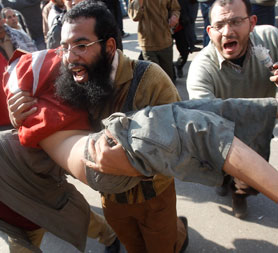Egypt unrest: casualties of the violence
As violence erupts on the streets of the Egyptian capital, Channel 4 News looks at the victims of the protests and speaks to “The Martyr” who helped mobilise thousands to take on the regime.

Since violent anti-government protests began in Egypt the United Nations’ human rights chief has said up to 300 people may have been killed.
Navi Pillay, the UN High Commissioner for Human Rights, urged Egyptian authorities to ensure the police and army avoid any excessive use of force and work to protect civilians.
The former UN war crimes judge placed blame for the unprecedented protests squarely on the government of President Hosni Mubarak, saying it had committed serious abuses including widespread use of torture while maintaining an emergency law since 1981 despite the absence of major strife.
“Casualties have been mounting on a daily basis, with unconfirmed reports suggesting as many as 300 people may have been killed so far, more than 3,000 injured and hundreds arrested,” Pillay said in a statement.
Cairo battle
On Wednesday violence erupted again on the streets of Cairo as pro-Mubarak supporters clashed with thousands of anti-government demonstrators in Tahrir Square.
Protesters threw rocks and Molotov cocktails as running battles were fought into the night. Footage showed people sheltering behind tanks from the oncoming volley.
Channel 4 News Correspondent Jonathan Rugman said he witnessed members of the pro-Mubarak crowd carrying baseball bats and a spear. A television cameraman and a number of other journalists were reported to have been injured in the clashes.
With a communications blackout affecting Egypt during the majority of the demonstrations which began last week, gaining a clear picture of casualties has proved difficult.
However video and pictures have emerged on the internet as web-savvy activists share information online.
Casualties
One blogger – who wished to remain anonymous – told Channel 4 News that his friend was currently fighting for his life in a Cairo hospital after being shot by a rubber bullet.
Ahmed Ahab has been in a coma since Friday’s demonstration in Tahrir Square where he was allegedly shot at close range.
In the eastern city of Suez, which has seen some of the worst violence since the unrest began, the body of Hamada Labib was carried through the streets after the 30-year-old he was killed in protests last week.
Methat tahar, Soliman Saber, Ghareeb Sayed, Mohammad Farrag and Mohammad Atef have also been named as protesters who have died in clashes across the country. Channel 4 News has been unable to independently verify the reports.
Video was posted online of the body Mostafa Reda Mahmoud who was killed in Suez on 25 January.
Other footage has also appeared on blogs, YouTube and Facebook showing unnamed people being shot and beaten.

Google is currently seeking help to find a missing executive who is believed to have taken part in the protests in Cairo.
Wael Ghonim, Google’s head of marketing for Middle East and North Africa, hasn’t been heard from since last Thursday night. Ghonim had tweeted about attending the protests before his disappearance.
A spreadsheet has been set up by activists in Canada and Lebanon to spread word of Ghonim’s disappearance and raise awareness of other missing people who “may not have a voice”.
Samer Karam, who set up the list, told Channel 4 News that so far the spreadsheet has been successful in finding 12 out of 21 people.
“The safety of our employees is very important to Google,” the web giant said in a statement. “If anyone has any information please call the following UK number: +44 20 7031 3008.”
Online martyr
Many of those killed have been named as martyrs by activists fighting for President Mubarak to immediately end his 30-year rule.
After a young man set himself on fire in Tunisia and sparked an uprising which toppled President Zine al-Abedine Ben Al, many Egyptians have looked to their own ‘martyr’ as a symbol of their plight.
We were watching Tunisia’s revolution together and he said, “We have to do something similar.” El Shaheeed
Khaled Said became a cause celebre for online Egyptian campaigners after the anti-corruption activist was tortured to death last year.
One of the driving forces behind Egypt’s current call for change is a Facebook group – We are all Khaled Said – which has drawn hundreds of thousands of users.
The group is run by anonymous campaigner El Shaheeed – translated as The Martyr – who told Channel 4 News that he works closely with the founder of Arabic version of the site, whom he has never met. Both Facebook groups receive hundreds of thousands of visitors.
“None of us know each other, or any details about each other – not even first names. We both call each other Khaled,” the anonymous blogger told Channel 4 News.
“We were watching Tunisia’s revolution together and he said, “We have to do something similar”. He then posted on the Arabic page that we should prepare a good gift to the brutal Egyptian police on 25th January.
“The answer came quickly from everyone. Tunisia broke the fear.”
The protest date quickly spread to other online groups and was coined as the day the uprising would begin. The Twitter hashtag #jan25 has picked up across the globe.
-
Latest news
-
Police try to shut down right-wing event as Nigel Farage speaks3m

-
‘Many things Netanyahu has done I disagree with, but I’m not giving up on Israel’, says top-ranking Democrat4m

-
Could US House be about to vote on Israel, Ukraine aid bill?2m

-
Number of people out of work due to long-term sickness at record high3m

-
Creating deepfake porn to be made a criminal offence after C4 investigation6m

-




